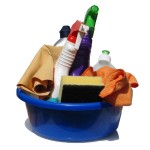 The three essentials for homemade cleaning solutions are vinegar, baking soda and liquid castile soap. Throw in a few additional supplies such as lemons, hydrogen peroxide, essential oil and rags, and you have almost anything you would need.
The three essentials for homemade cleaning solutions are vinegar, baking soda and liquid castile soap. Throw in a few additional supplies such as lemons, hydrogen peroxide, essential oil and rags, and you have almost anything you would need.
Vinegar is an almost limitless solution that cleans, gets rid of mildew and stains, acts as a disinfectant, deodorizes, etc.
Baking Soda is an excellent scouring agent and works well mixed with vinegar (but watch out for the reaction!) or with water to form a paste.
Liquid castle soap is a gentle alternative to vinegar for jobs and surfaces that need extra care, such as some dishes and marble/granite counter tops.
Lemons and oranges can be used in many cleaning solutions as both a disinfectant and a deodorizer.
Hydrogen Peroxide is a disinfectant that can be used to make a bleach alternative.
Essential oils such as tea tree, lemon and orange have antibacterial properties.
Rags are an excellent re-usable replacement for paper towels, and old toothbrushes are also handy to keep around.
Some recipes call for both vinegar and liquid castile soap, but if the two are mixed, the acidic vinegar will cause the castile soap to “unsaponify” and return to its original oil base. The best solution, if you want to use both ingredients, it to clean the surface first with the castile soap and rinse it. Follow-up with a diluted vinegar rinse; that way they will not be mixed.
Despite the fact our recommended cleaning solutions are split into kitchen, laundry and bathroom editions, most solutions in each category are interchangeable, and/or have many other uses. But before we get into those, let’s look at two recipes that can be used to clean just about anything all by themselves.
Citrus Vinegar
Stuff a glass jar with lemon or orange peels and fill the remaining space with white vinegar.
Screw lid on tightly and let set for 2 weeks, shaking daily to mix.
After 2 weeks, strain the liquid into a separate spray bottle, and enjoy your extra-powerful citrus-scented vinegar cleaning solution.
The solution also works well diluted 50/50 with water.
Citrus Enzyme Cleaner
Mix the following ingredients in a 2-liter plastic bottle (not glass!):
1 Liter Water
1/2 Cup Brown Sugar
2 Cups Lemon or Orange Scraps
1 Teaspoon Yeast (Unless You Can Wait 3 Months)
Once the above ingredients are mixed, let them set for 2 weeks to ferment, shaking the mixture daily.
If you leave out the yeast, the mixture will need to set for 3 months to ferment.
It is important, in either case, to make sure the lid is left very loose on the bottle (except during shaking) in order to prevent explosions (this is also why you are using a plastic bottle instead of glass).
After the 2 weeks (or 3 months!) are up, strain the fermented liquid into a separate bottle.
It should be watered down before most uses, by adding 1/2 to 1 cup enzyme cleaner to 1 liter of water.
This solution can efficiently clean dishes, laundry, bathrooms, stains, odors, fruits/vegetables, vehicles, floors, etc. It is also said to work as a skincare product (facial cleanser/toner), plant fertilizer, insect repellent, etc. It works well on mold, too.
Citrus Enzyme Cleaning Scrub
Save the pulp strained out of the finished citrus enzyme cleaner and use it to make a citrus enzyme cleaning scrub. Toss the remaining pulp into a blender (or food processor, etc.) and blend until slushy. Add 1 – 2 cups of baking soda, a little at a time, and continue to blend until the paste is the consistency you want it to be.
This scrub would be excellent to clean sinks, bathtubs, and any other surfaces requiring a little extra elbow grease.
With these basic recipes in mind, we can now move on to more specifics:
Household Cleaning Solutions (Floor Edition)
Household Cleaning Solutions (Kitchen Edition)
Household Cleaning Solutions (Laundry Edition)
Household Cleaning Solutions (Bathroom Edition)
Household Cleaning Solutions (Miscellaneous Edition)